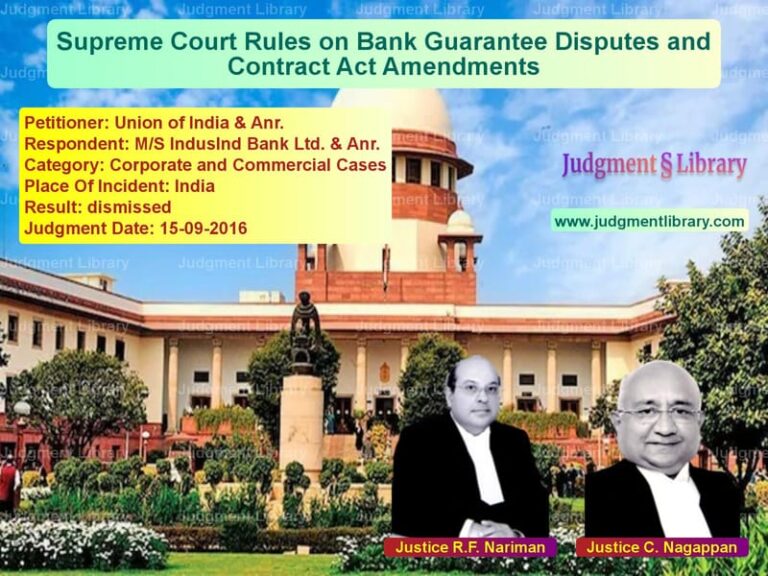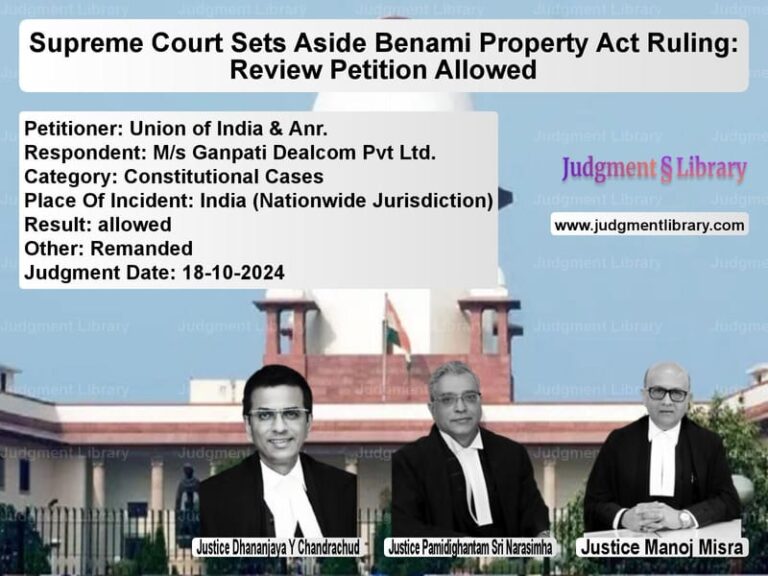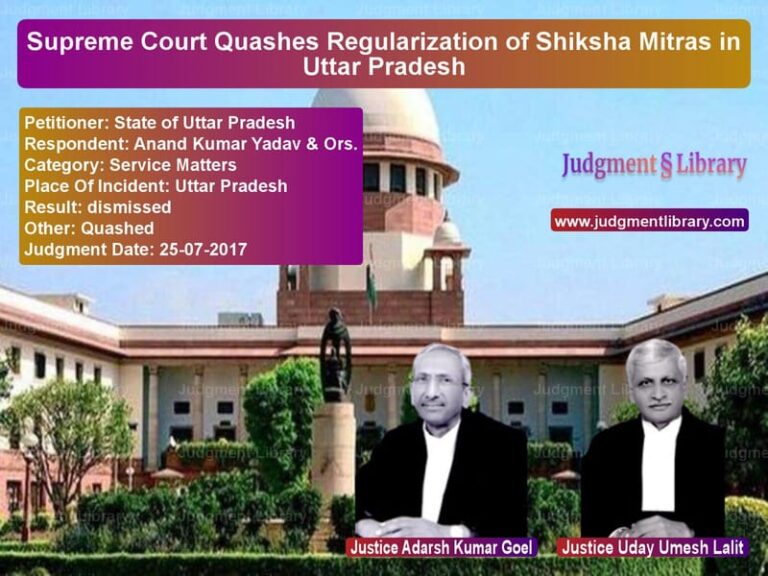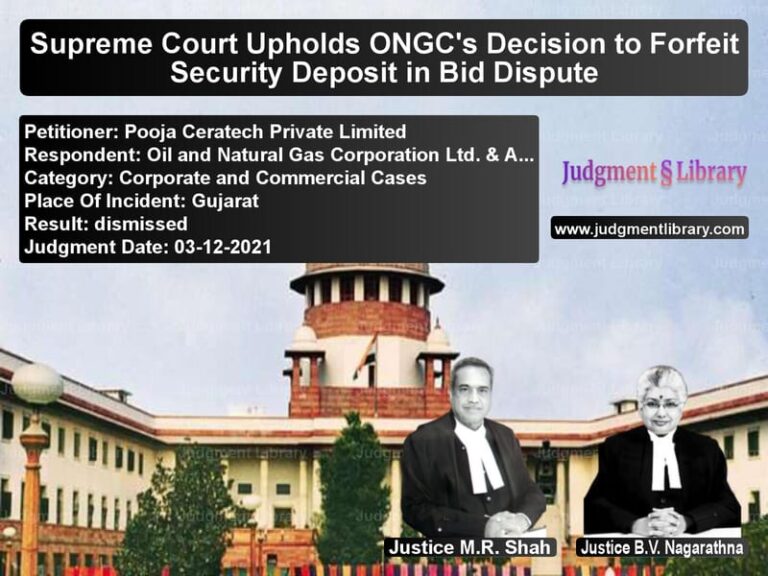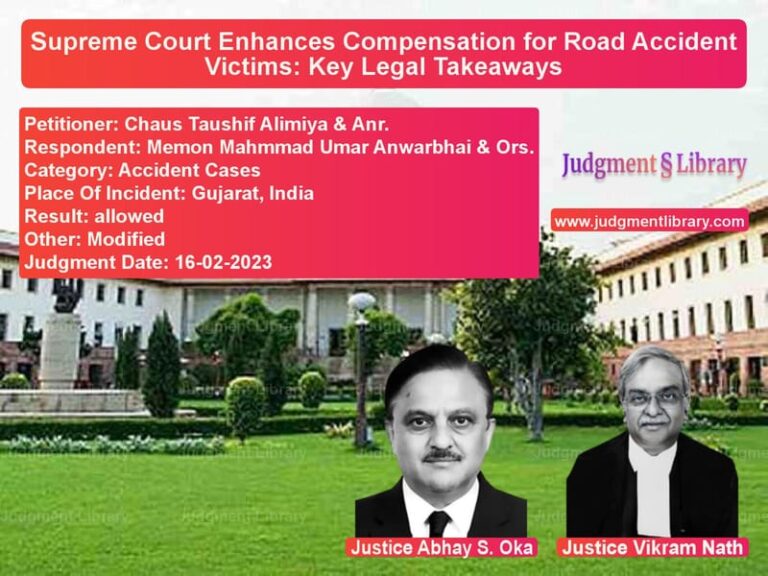Supreme Court Rejects Bail Plea of Satyendar Jain in Money Laundering Case
The Supreme Court of India recently delivered a crucial judgment in the case of Satyendar Kumar Jain vs. Directorate of Enforcement, rejecting bail pleas of the accused in a high-profile money laundering case. This ruling reinforces the strict application of the Prevention of Money Laundering Act (PMLA) and the necessity to meet the twin conditions of Section 45 of the Act for bail.
Background of the Case
The case stems from allegations that Satyendar Kumar Jain, a former Minister in the Delhi Government, along with his associates Ankush Jain and Vaibhav Jain, was involved in laundering money through shell companies. The Enforcement Directorate (ED) alleged that between 2015 and 2017, Jain and his associates used shell companies in Kolkata to launder ₹4.81 crores.
The case began with an FIR registered by the Central Bureau of Investigation (CBI) in 2017 under Sections 109 IPC and 13(2) read with Section 13(1)(e) of the Prevention of Corruption Act, 1988. Based on this, the ED registered an Enforcement Case Information Report (ECIR) in August 2017 under Section 3 and Section 4 of the PMLA. Jain was arrested on May 30, 2022, while Vaibhav and Ankush Jain were arrested a month later on June 30, 2022.
Read also: https://judgmentlibrary.com/supreme-court-modifies-life-sentence-in-kerala-quadruple-murder-case/
Key Legal Issues
- Whether the accused had engaged in money laundering as per Section 3 of PMLA.
- Whether the trial court and High Court were correct in rejecting bail under Section 45 of PMLA.
- Whether the defense’s arguments about procedural lapses and lack of direct involvement justified bail.
Arguments by the Appellants (Satyendar Jain & Others)
The legal counsel for Jain, Senior Advocate Abhishek Manu Singhvi, put forth the following arguments:
- The appellant had already been granted bail in the predicate offense (corruption charges under the Prevention of Corruption Act).
- Jain was arrested by the ED nearly five years after the ECIR was registered, despite cooperating with investigations.
- The amount attributed to Jain in the ED’s prosecution complaint (₹4.81 crores) was inconsistent with the CBI’s charge sheet, which mentioned only ₹1.47 crores.
- The alleged laundered money was not directly linked to Jain but rather to companies where he had resigned as a director two years before the check period.
- The ED had not established Jain’s direct involvement in handing over cash for laundering, and the statements of witnesses were self-contradictory.
Arguments by the Respondent (Enforcement Directorate)
The ED, represented by Additional Solicitor General S.V. Raju, countered with the following arguments:
- Jain, as a public servant, engaged in laundering money through shell companies controlled by him and his family members.
- The investigation revealed that shell companies received accommodation entries from Kolkata-based entry operators against cash payments.
- Key witnesses, including accountants and entry operators, confirmed Jain’s direct involvement in planning and executing the transactions.
- Both Vaibhav and Ankush Jain made declarations under the Income Disclosure Scheme (IDS) in 2016 to shield Jain by falsely declaring the laundered money as their own.
- The ED had substantial documentary evidence, including tax records and bank transactions, showing the movement of money through layered transactions.
Supreme Court’s Observations and Judgment
1. Money Laundering is a Serious Offense
The Court reaffirmed that money laundering is not just a financial crime but has serious national economic implications:
“Money laundering is an aggravated offense that requires stringent measures, and the burden of proof is on the accused to show that they are not guilty under PMLA.”
2. Failure to Satisfy Twin Conditions of Bail Under Section 45 PMLA
The Court emphasized that the appellants failed to meet the twin conditions necessary for bail:
“The appellants have failed to satisfy the twin conditions of Section 45 PMLA—first, that they are not guilty of the offense, and second, that they will not commit any offense while on bail.”
3. Direct and Indirect Involvement of Satyendar Jain
The Court ruled that Jain was the mastermind behind the money laundering operation:
“Satyendar Kumar Jain was the conceptualizer, initiator, and supervisor for the entire operation of accommodation entries.”
4. Role of Vaibhav and Ankush Jain
The Court found that both had actively assisted in laundering money:
“Vaibhav Jain and Ankush Jain knowingly assisted Satyendar Kumar Jain in projecting proceeds of crime as untainted.”
5. Inconsistencies in the Defense’s Claims
The Court dismissed the argument about discrepancies in figures cited by the CBI and ED:
“The accommodation entries facilitated during the check period establish that the entire ₹4.81 crores were laundered through a network of shell companies.”
6. Political Influence and Witness Protection
The Court took note of witness statements indicating fear of Jain’s political influence:
“Two entry operators have expressed concerns that Jain’s influence could be used to intimidate witnesses.”
7. Final Ruling
The Supreme Court rejected the bail plea and ordered Jain’s immediate surrender:
“The appellant Satyendar Kumar Jain shall surrender forthwith before the Special Court. The right to a speedy trial remains protected, and Section 436A CrPC will apply to ensure fair trial proceedings.”
Implications of the Judgment
This ruling has significant implications:
- Strengthens PMLA enforcement: Reinforces the strict bail conditions under Section 45.
- Establishes accountability of public officials: Prevents misuse of office for personal enrichment.
- Protects the integrity of financial investigations: Upholds the credibility of ED’s probe.
- Ensures witness safety: Acknowledges risks associated with influential accused persons.
The decision serves as a precedent for stringent enforcement of money laundering laws in India.
Petitioner Name: Satyendar Kumar Jain.Respondent Name: Directorate of Enforcement.Judgment By: Justice Bela M. Trivedi, Justice Pankaj Mithal.Place Of Incident: Delhi.Judgment Date: 18-03-2024.
Don’t miss out on the full details! Download the complete judgment in PDF format below and gain valuable insights instantly!
Download Judgment: satyendar-kumar-jain-vs-directorate-of-enfor-supreme-court-of-india-judgment-dated-18-03-2024.pdf
Directly Download Judgment: Directly download this Judgment
See all petitions in Money Laundering Cases
See all petitions in Public Sector Employees
See all petitions in Judgment by Bela M. Trivedi
See all petitions in Judgment by Pankaj Mithal
See all petitions in dismissed
See all petitions in Stayed
See all petitions in supreme court of India judgments March 2024
See all petitions in 2024 judgments
See all posts in Criminal Cases Category
See all allowed petitions in Criminal Cases Category
See all Dismissed petitions in Criminal Cases Category
See all partially allowed petitions in Criminal Cases Category


